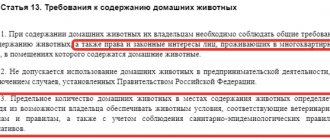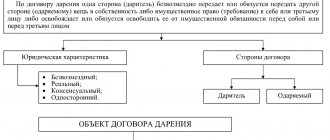Definition
A communal apartment is a property for living with several owners. The premises have a toilet, hallway and kitchen. According to the current law, tenants and owners can live in it. The parties dispose of the premises and things under Art. 30 Housing Code of the Russian Federation. Residents need to follow the rules of residence and not infringe on the rights of their neighbors. Owners can live or rent out. The second option is impossible without the consent of the remaining residents.
If persons without registration will live in a communal apartment, a special agreement must be concluded. The owner can register people's data. This procedure is free of charge, but it is carried out in accordance with the rules for the use of housing. The room is used by guests in the same way as by the owners.
A communal apartment is a room where a guest without registration should not stay for more than 3 months. If this rule is violated, neighbors can notify regulatory authorities. The housing code establishes that a communal apartment is a premises whose residents have equal rights of use.
What is a communal apartment, definition by law
Expert opinion
Mironova Anna Sergeevna
Generalist lawyer. Specializes in family issues, civil, criminal and housing law
A communal apartment is a dwelling in which several residents simultaneously live. However, they often do not act as relatives in relation to each other. Such housing may have several rooms. Each of them is home to a citizen or family. At the same time, they can be both owners and simple employers. For a communal apartment, the definition by law is indirectly provided for in the Housing Code (Article 41). It states that premises in communal apartments belong to their owners by right of shared ownership.
Communal housing often has a shared toilet and bathroom. The common property in it is also the entrance hall along with the kitchen. Owners have the same rights, along with responsibilities, as owners of full-fledged apartments.
They can manage their premises and rent them out. At the same time, the Housing Code in Article 30 instructs the owners and tenants of housing to monitor its condition, use it in accordance with the established rules of residence and take into account the interests of neighbors.
Residents' rights
In a communal apartment, the rights of residents are the same. Owners can live and rent out their part. You don't need your neighbors' permission for this. But when unregistered persons reside, it is necessary to conclude agreements between the parties. The owner can register residents. Settlement and registration are free of charge, but according to the order of use of such facilities.
Guests have the right to use common areas like other residents. The duration of their stay should not be longer than 3 months. If this rule is violated, others may contact the appropriate authorities. The rules and responsibilities are the same for all residents.
Rules and requirements
Living in a communal apartment has some disadvantages. Living together with other people who have their own ideas about life is almost never without unpleasant moments. Disagreements often arise due to cleaning, noise, and lack of order in the common area.
A communal apartment is a room where all residents must treat furniture and household items with care and respect. The owner of the property may, without the permission of neighbors:
- Rent premises under contract.
- Register citizens in it.
Neighbors are dissatisfied and believe that the residence of other persons is an infringement of their rights. If a person smokes indoors, you should contact law enforcement. Dissatisfaction arises because of pets. Cleaning and repairs must be carried out on the rented part.
Neighbors as a pricing factor
Often it is the morals and habits of neighbors that make an overall decent room unsaleable (hence the impressive range in prices for rooms with similar characteristics).
The first thing you need to do when choosing a communal dwelling to suit your taste is to look closely at it, agree on the use of the kitchen and bathroom, and find out about your plans for life.
Experienced realtors have long noticed: the fewer neighbors there are in a communal apartment, the more complex the relationship. In an apartment for three or four families or a dormitory with long-standing “dormitory” traditions, it is often easier to agree on organizing a shared life than with one single neighbor.
But even if your possible “partners” are charming and pleasant in all respects, do not rush to rejoice. The average communal apartment is a walk-through yard: owners and residents change more often than in separate apartments.
Payment
How are utilities paid in communal apartments? Residents pay for electricity, gas and other services based on the size of the room. Counters located in rooms are also taken into account. Residents make payments using their measurements. Payment for the common area is carried out by agreement of the owners.
If there are no metering devices in the rooms, then services are paid for by agreement. This is done taking into account the number of residents or area. If the parties do not resolve this issue independently, then the following rules apply:
- The number of electrical devices in the room is studied.
- Heat is paid for according to the territory.
- Gas and water are paid according to the number of people.
It is necessary to contact neighbors to agree on payment for utilities in communal apartments. If desired, an agreement is drawn up to determine the procedure for using common property. The court decides the issue if the owner has a debt for utility bills in a communal apartment and does not want to pay it. The rest of the residents should not have to solve this problem and suffer financial losses.
Mortgage and maternity capital? It's real
A few years ago, banks were reluctant to provide mortgages for the purchase of rooms. Basically, only for the purchase of the last room (share) in the apartment, while the entire apartment became the object of collateral.
This year the situation has changed. Maternity capital can also be used to partially or fully repay the loan. The requirements put forward by banks for mortgage rooms vary. But in general terms this is an area of 12 square meters. m, the presence of all communications and amenities, as well as the absence of wooden beams in the floors of the house. Of course, this should be a room, and not a share in the apartment.
Sale
According to Art. 250 of the Civil Code of the Russian Federation, neighbors in a communal apartment have an advantage in the right to purchase a room. If they do not want to buy it, they must issue a written refusal. Often, residents do not want to purchase housing, but they also do not refuse to purchase due to legal requirements. In this case, you must send a written notice of sale, which must be certified by a notary.
When persons have received this information, they are considered to have been notified. If a response is not received within 30 days, this is considered a refusal. If minors refuse, this must be recorded with the participation of representatives of the guardianship authorities. When a neighbor acquires a share, other people should not be notified about this.
The deal may be disrupted if the owners are not notified of this in advance. The contract will be declared invalid within a month. The law establishes the powers of the neighbor if the specified period was missed for valid reasons.
Any neighbor can purchase a communal apartment or its room. When the tenant of a room stops living on the basis of a social tenancy agreement, the owner and other tenants have the right to this premises. The Housing Code defines preferential rights for:
- Low-income people who need improved housing conditions.
- Low-income people who do not have housing.
- Other citizens who wish to buy a share.
The rights and responsibilities of residents are established by law, but there are also rules for cohabitation that must be followed. It is necessary not to lead to conflicts and not to express constant dissatisfaction. You also need to keep order and cleanliness.
Subtleties of privatization
You can only privatize living space that is rented under a social tenancy agreement. In this case, the tenant privatizes only his living space, and not the entire apartment.
To undergo the privatization procedure, the employer must obtain written consent from all family members. If someone refuses to participate in privatization, then a written refusal is required, which must be notarized.
If you have a minor child, then the privatization procedure is impossible without the consent of the guardianship and trusteeship authorities. This is necessary in order to protect the interests of your child in the future.
It is important to comply with the following requirements:
- providing the child with living space equivalent to the previous one;
- compliance with sanitary and hygienic requirements.
Important! The consent of neighbors is not required for privatization.
Use of common area
All residents can use the entrance hall, corridor, toilet, bathroom and kitchen. The order and rules for using these places are not established by law. The rules of residence must be agreed upon with the residents and must be followed. Disputes are resolved in court.
Owners of premises do not have the right to alienate or allocate a share in kind in territories that belong to other owners. When selling a share, the new owner can use the common territory, and the seller loses this right.
Common areas include:
- Bathroom.
- Corridor.
- Kitchen.
- Storage room.
According to the rules, furniture without the consent of other persons can be placed only in places adjacent to the room. In common areas, the rights of neighbors must not be violated. You should not fill the area with trash and bulky things.
The order of use of these premises is not recorded in the documents; such issues are resolved by the residents. Disagreements are resolved in court. If a person sells a room in a communal apartment, then his right to use the premises disappears. All functions will have to be performed by the new owner, as well as payment for utilities.
Persons living in communal apartments are required to clean the bathroom and kitchen. This must be done weekly by agreement. Typically, cleaning is done one at a time. You need to draw up a schedule, taking into account the number of people living in the room. Cleaning your area is left to its owner.
Redevelopment is a matter for all residents, since there are common areas. This procedure is formalized in writing with the participation of a notary. Not only is permission for redevelopment required from the remaining residents, it is important that the plan is approved by a special authority. We need to create a redevelopment project. The changes do not affect load-bearing walls.
A room can become an apartment, but this cannot be done due to the technical component. There may be difficulties in preparing documents. Typically, this procedure requires major redevelopment.
Own room in a communal apartment
The main advantage of modern communal apartments, unlike Soviet ones, is that they can be privatized, that is, registered as private property. The rules on how to do this are contained in the Housing Code of the Russian Federation, Law of the Russian Federation dated July 4, 1991 N 1541–1 “On the privatization of the housing stock.” According to the legal definition,
“privatization of residential premises is the free transfer into the ownership of citizens of the Russian Federation on a voluntary basis of residential premises occupied by them in the state and municipal housing stock.”
Article 1 of the Law of the Russian Federation of July 4, 1991 N 1541–1 “On the privatization of housing stock”
That is, privatization is characterized by the fact that it is free and voluntary.
You can only privatize the premises in which you live legally (for example, on the basis of a social tenancy agreement). The law prohibits the privatization of premises recognized as unsafe.
Privatization must be distinguished from a purchase, because you are privatizing municipal property (and it becomes private), but you are buying private property (one private property has passed into another - the owner has changed). In addition, we repeat, privatization of housing, unlike purchase, is free.
The procedure for privatizing a room in a communal apartment
- Collect the necessary documents:
- identification documents (birth certificates, passports) of all citizens living in the room. All residents must be registered in this room, have a legal basis for residence,
- a social tenancy agreement under which you received the right to live in a room,
- order to move into a room (original or copy obtained from the archive),
- certificates from the management company: about the number of people living in the room, about the absence of arrears in payments (rent, utilities),
- technical documents for the apartment and room (plan, technical passport), which can be obtained from the BTI,
- a certificate stating that you have never participated in privatization (privatization of housing by your family when you were a minor does not count).
- To write an application. Its form is established by city authorities. An application is written by each adult living in the room, or one application is written, which is signed by all adult residents.
- Submit an application and a package of documents to the municipal authorities (city administration). They will tell you which department to contact. There is no “single recipe” here, because the structure of government bodies in each municipality is individual.
- Waiting for the municipality's decision. Its bodies may agree to privatization, or they may refuse. In this case, you can appeal such a decision in court (if you are morally and financially prepared for the trial).
- If the decision is positive, privatization will be carried out, that is, the conclusion of a residential premises transfer agreement between you and the local government bodies that own the communal apartment. The fact of privatization is confirmed by this agreement.
- Registration of your acquired property rights to residential premises. To do this, after concluding the contract, you need to contact the nearest branch of Rosreestr with all the documents for the room, the agreement for the transfer of residential premises, a passport and a receipt for payment of the state duty. Within seven working days, Rosreestr will enter information about privatization and your rights into the Unified State Register of Real Estate. To register, you can also contact the MFC, where they will accept your documents and transfer them to Rosreestr (if you don’t want to go there yourself), but this will take a little longer (up to nine working days).
Please note that the social contract hiring at the time of contacting the municipality must be edited if the composition of the family has changed. Let’s say that five years ago the spouses entered into an agreement, during which time they had a child, but information about him was not included in the agreement. In this case, they may be denied privatization. The same applies to deceased family members, information about whom was initially recorded in the contract.
What to do with troublemakers?
The rules of residence and the fight against violators are interconnected. All people have the right to have their rights protected. If the problem cannot be resolved peacefully, then the court will help to do this. To do this, you need to file a claim.
Disputes often arise over violations of the rights of residents to common areas. Once the sentence is passed, bailiffs must monitor the fulfillment of obligations. If it comes to silence, then you need to contact law enforcement. You must submit your application in writing. These bodies resolve issues regarding smoking in public places, storage of toxic components and damage to property.
In case of illegal redevelopment, which may be a threat to the integrity of the object, you need to contact the BTI. It is advisable to maintain friendly relations between neighbors, otherwise legal disputes will escalate the situation.
Settlement
In some regions there are targeted programs to improve the living conditions of the population through the resettlement of communal apartments. This is necessary to eliminate such housing, which still exists even in large Russian cities.
Resettlement allows residents who have inadequate living conditions to acquire their own new housing. This is carried out by recognizing the premises as dilapidated and subject to demolition. Many citizens want to improve their living conditions with the help of the program. Often, instead of communal apartments, new houses and neighborhoods are built. The resettlement of citizens without their consent is possible only on the basis of a court decision.
To participate in the program, a person must be recognized as a person in need of improved living conditions. The resettlement of communal apartment owners is a lengthy process. You can participate in it only if you can prove that it is impossible to live in this premises. There is a list of people applying for participation in the program or receiving assistance for purchasing housing or adding a room:
- Heroes of Labor.
- Heroes of the USSR and Russia.
- Judges.
- Employees of the Investigative Committee, Ministry of Internal Affairs, military personnel.
In order for a premises to participate in the program, documents must be prepared. Then a commission is appointed that will check the condition of the housing. The result of the assessment is an act and a resolution of the commission. If everything goes through, the building will participate in the resettlement program.
The register of residential premises includes a list of houses that are dilapidated. It is posted on the city's official website. Dilapidated housing is a structure whose wear is more than 70% (for stone) and 60% (for wood). A building is unsafe if 2/3 of it is uninhabitable.
Over time, there are fewer and fewer communal apartments, but there are still many of them in Russia. In this type of housing, living standards must be observed. But there are also former communal apartments that have become ordinary real estate.








